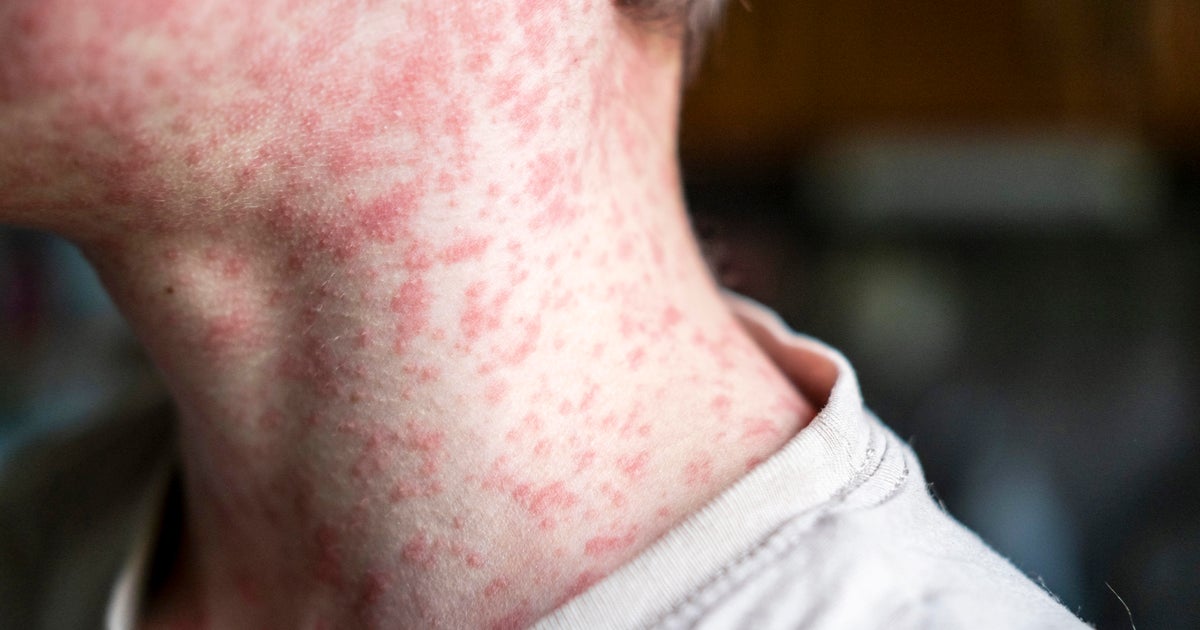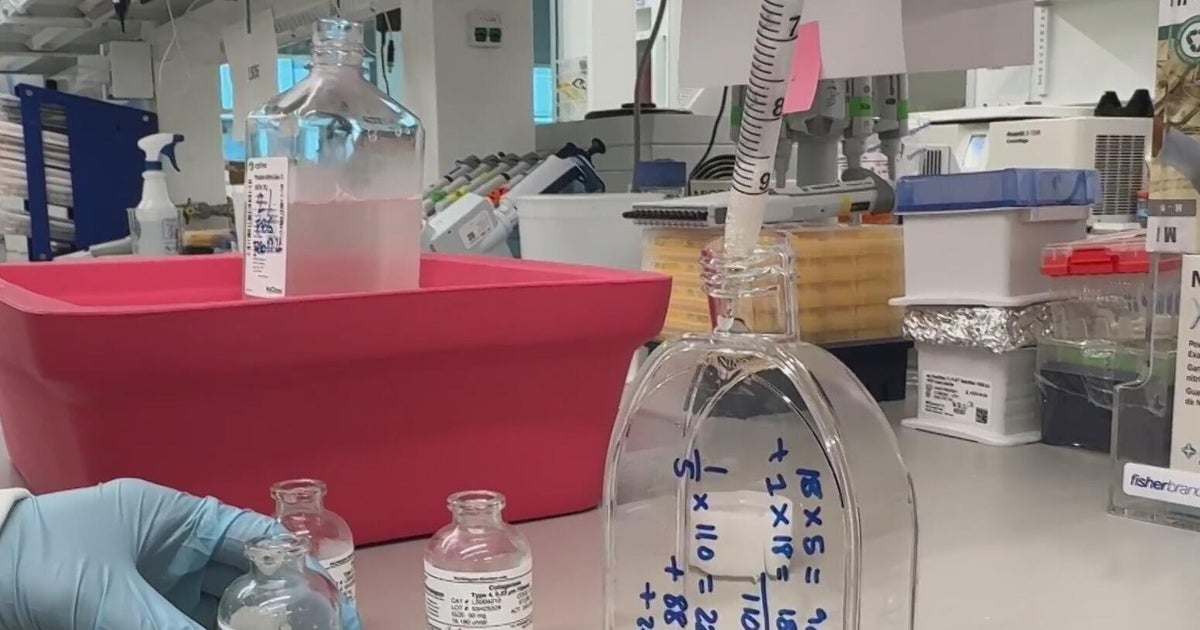CDC Confirms Patient In Dallas Has Ebola Virus
Follow CBSDFW.com | Facebook | Twitter
DALLAS (CBSDFW.COM) - Officials with the Centers for Disease Control and Prevention have confirmed that a person in Dallas definitely has the Ebola virus. Tuesday's official determination makes the patient, now isolated at Texas Health Presbyterian Hospital Dallas, the first diagnosed Ebola case in the United States.
Officials with the Centers for Disease Control and Prevention, Texas Department of State Health Services, Presbyterian Hospital and Dallas County Health and Human Services all participated in a Tuesday afternoon press conference. CDC Director Thomas Frieden related the information that the individual who tested positive had traveled to Liberia. The person left Liberia on September 19 and arrived in the United States on September 20 with no virus symptoms. Frieden said that it was four or five days later that the patient, who is believed to be male, began developing symptoms and was ultimately admitted to Presbyterian Hospital in Dallas on Sunday, September 28.
Ebola Patient's Arrival In North Texas
"We received in our laboratory today specimens from the individual, tested them, and they tested positive for Ebola," Frieden stated. "The State of Texas also operates a laboratory that found the same results." After the confirmation statement, Frieden went on to stress that the testing for Ebola is very accurate, saying that it is a PCR test of blood.
As far as the medical condition of the infected patient, Frieden said that he "is critically ill at this point." Presbyterian Hospital would not confirm the condition of the individual, citing the patient's right to privacy. CBS 11 News learned late Tuesday evening that the man is communicating with health workers and telling them when he is hungry.
The patient is in a special isolation section of the Intensive Care Unit and is being watched through glass walls. Officials said that an important part of his treatment is making sure that he is well hydrated. Dallas Fire Rescue has confirmed the patient was transported from The Ivy Apartments, located at 7225 Fair Oaks, in North East Dallas on Sunday.
An Exclusive Look Inside Isolation Rooms
After confirmation of the virus, the City of Dallas was put on Level 2: High Readiness. The city is now working closely with DCHHS and the CDC.
Doctors said that the patient will remain in North Texas and be treated at Presbyterian Hospital in Dallas. Frieden expained why that decision was made, saying that almost every hospital in the U.S. with isolation facilities can do isolation for Ebola. "We don't see a need, from either a medical or a infection control standpoint, to try and move the patient," he said.
It was also learned Tuesday that the patient had felt ill and went to the emergency room late Thursday or early Friday, but showed no signs of flu or any other serious or life threatening illnesses. He was given an antibiotic and released. He had become so ill by Sunday that an amulance was called to transport him back to the hospital. With his symptoms much worse, health workers started checking his travel history and questioning whether or not he could have Ebola.
Now that the virus is confirmed, Frieden said that the next steps are three-fold. "First, to care for the patient," Frieden said, "to provide the most effective care possible, as safely as possible, to keep -- to an absolute minimum -- the likelihood or possibility that anyone would become infected. And second, to maximize the chances that the patient might recover."
Frieden said that another important step would be to identify all of the people who may have had contact with the patient while he could have been infectious. Frieden did state with emphasis that Ebola DOES NOT spread from someone who is not infectious. "It does not spread from someone who doesn't have fever and other symptoms," he said. "So, it's only someone who is sick with Ebola who can spread the disease."
Ebola is spread through direct contact with blood, secretions or other bodily fluids, or exposure to contaminated objects like needles. Symptoms of Ebola include high fever, headache, body aches, coughing, stomach pain, vomiting and diarrhea. There is no vaccine for Ebola, but doctors are able to treat the symptoms.
Ebola In The United States: What You Need To Know
Officials said that once those who had contact with the patient are identified, they will be monitored for 21 days after the exposure, to see if they develop a fever. Frieden said, "If they develop fever, then those same criteria are used to isolate them and make sure that they are cared for as well as possible, so that they maximize their chances [for recovery] and to minimize or eliminate the chance that they would infect other people."
Three members of the ambulance crew that transported the patient have tested negative for the virus and are in isolation at their homes. Health officials are continually monitoring their symptoms and health condition.
EMS Crew Exposed To Ebola Patient Tests Negative
Several minutes into the press conference, Frieden paused and stated clearly, "The bottom line here is that I have no doubt that we will control this importation of this case of Ebola so that it does not spread widely in this country."
Frieden did admit that it is possible that a family member or other person who had contact with the patient while he was infectious could develop Ebola in the coming weeks. But, he said, "There is no doubt in my mind that we will stop it here."
It still is not known how the patient became infected, but Frieden said that he "undoubtedly had close contact with someone who was sick with Ebola or had died from it."
The commissioner of the Texas Department of State Health Services, David Lakey, M.D., joined the press conference by phone and explained that a specially trained team in Austin had been certified to perform Ebola testing back in August. Blood samples from the patient were received at the Texas Public Health Laboratory at 9:00 a.m. and, by 1:00 p.m., were definitely confirmed to be positive for Ebola.
Noting the contact with state, national and local North Texas agencies, Lakey said, "We have no other suspected cases in the State of Texas at this time. We're committed to keeping Texas safe."
DFW Residents From Africa React To Ebola News
Presbyterian Hospital epidemiologist Edward Goodman said during the press conference that the hospital has had a plan in place for Ebola for some time now and that a recent event, coincidentally, made the team in North Texas especially prepared. "Ironically enough, in the week before this patient presented, we had a meeting of all the stakeholders that might be involved in the care of such a patient and, because of that, we were well prepared to deal with this crisis."
Dallas County Health and Human Services director Zachary Thompson was also part of the press conference and detailed briefly how the county is conducting public health follow-ups that include investigating who the patient had contact with, and gathering information about the patient's travel history and activities.
With the first U.S. diagnosed case of Ebola in Dallas, Thompson took time to try and put the minds of North Texans at ease. "Dallas County Health and Human Services will proceed with the pubic health follow-up, per CDC guidelines," he said. "Dallas County Health and Human Services wants Dallas County residents to be reassured that your public health is our number one priority."
Community Shocked By Ebola Case, But Not Panicked
When asked if there was any danger for the individuals who were on the plane traveling with the now sick patient, Frieden again stressed that Ebola does not spread until the person actually gets physically ill. Frieden said that he does not believe there is any risk to anyone that was on any plane the person had traveled on.
Frieden said that the CDC is working in conjunction with airports around the world. "One of the things that CDC has done in Liberia, Sierra Leone, Guinea and Lagos is to work with the airport authorities so 100 percent of the individuals getting on planes are screened for fever before they get on a plane. And, if they have a fever, they're pulled out of the line, accessed for Ebola, and don't fly unless Ebola is ruled out."
Business As Usual At DFW Airport Despite Ebola Case
It was late on the evening of September 29 that CBS 11 News learned a patient at Texas Health Presbyterian Hospital in Dallas was feared to have been exposed to the Ebola virus. Health officials said that, given the information that the unnamed patient had been in the West Africa area where the Ebola virus exists and the type of symptoms they were exhibiting, testing would be performed.
After the information was related to the CDC, the health institute sent a team to North Texas just in case the patient was indeed infected with the Ebola virus. A team of CDC epidemiologists and Public Health Preparedness and Response member David Daigle are now in Dallas.
CDC Members Arrive In North Texas For Ebola Fight
According to officials with the White House, President Barack Obama was in Washington, D.C. when he briefed about the diagnosis in a call from Frieden. Meanwhile, Gov. Rick Perry plans to hold a news conference in Dallas on Wednesday afternoon to discuss the Ebola diagnosis.
Monday night, Texas Health Presbyterian Hospital in Dallas released the following statement:
"Texas Health Presbyterian Hospital Dallas has admitted a patient into strict isolation to be evaluated for potential Ebola Virus Disease (EVD) based on the patient's symptoms and recent travel history. The hospital is following all Centers for Disease Control and Texas Department of Heath recommendations to ensure the safety of patients, hospital staff, volunteers, physicians and visitors. The CDC anticipates preliminary results tomorrow."
Of course, since the patient was already in "strict isolation," officials at Presbyterian Hospital said that will continue.
On Monday night, CBS 11 News spoke with Thompson, who stressed that there were certain procedures that would need to be followed if tests for the patient come back positive. "We [health professionals] all had been planning to look at what our next steps are if there is a confirmed case," Thompson said. "Again, we have to do the public health follow up to see what contacts, where this individual has gone since they arrived here in Dallas. There are a number of things that have to be looked at."
Before it was confirmed that the patient definitely had the virus, Thompson spoke about the possibility of other North Texans being infected by the patient. "The key point is, if there's been no transmission, blood, secretion, any type of bodily fluids by the infected person to someone else, then that risk is low to none."
The Ebola virus has killed more than 3,000 people across West Africa and infected several Americans who have traveled to the region, including Fort Worth doctor Kent Brantly, who contracted the disease while doing missionary work in Liberia. Earlier this month, Brantly donated a unit of his blood to help treat an American aid worker who was being cared for in Nebraska. While the medical procedure has not been proven, doctors were experimenting to see if antibodies in Brantly's blood could help strengthen the immune system of the patient. There is no word on if that approach will be taken with the patient in Dallas.
In all, four infected patients have returned to the United States in specially outfitted planes -- three were treated in Atlanta and the fourth, who Brantly donated blood to, was treated in Omaha. An American physician who was exposed to the virus, but not infected, was flown to Maryland over the weekend.
Since July 27, a dozen people in the U.S. had been tested for Ebola, but all those tests were negative.
More Ebola Information: CDC | WHO
(©2014 CBS Local Media, a division of CBS Radio Inc. All Rights Reserved. This material may not be published, broadcast, rewritten, or redistributed.)
Latest News:
Top Trending:







